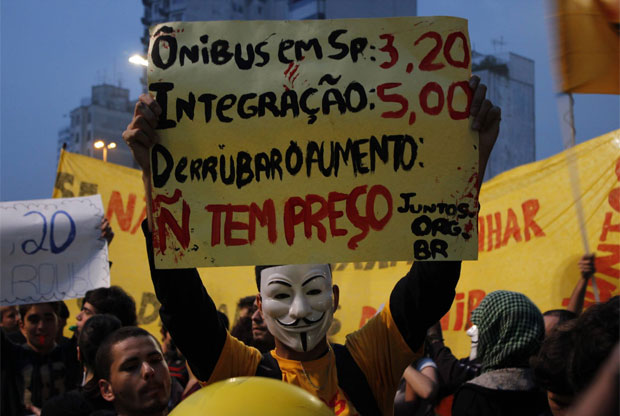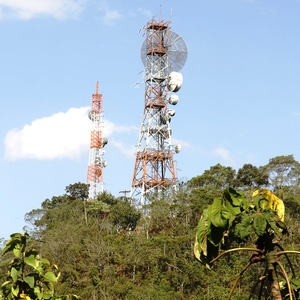Brazil’s mass protests represent a new force in the country’s politics. The wave of demonstrations —sparked by increasing transit fares — have shaken the country’s lethargic leaders, Rafael Spuldar reports


Brazil’s mass protests represent a new force in the country’s politics. The wave of demonstrations —sparked by increasing transit fares — have shaken the country’s lethargic leaders, Rafael Spuldar reports
A judge from the Brazilian state of São Paulo has barred a protester from an allegedly illegal construction site or even posting about it on Facebook. It’s the latest in a string of rulings targeting social media in the country. Rafael Spuldar reports

Brazil’s Federal Police seized a journalist’s equipment – including his computer – during an operation to remove indians from a farm in the state of Mato Grosso do Sul. The seizure was decried as illegal by the reporter’s employer, one of the country’s most prominent aid agencies aimed at indigenous peoples, Rafael Spuldar reports.

Brazil’s position in free speech’s world charts has consistently worsened in recent years, Rafael Spulder writes from Sao Paolo.

Local broadcasters, the lifeblood of many Brazilian communities, face tough times. Rafael Spuldar reports
A photojournalist was gunned down on 14 April in the Brazilian state of Minas Gerais. Photographer Walgney Assis Carvalho was shot in the back during a day spent fishing in the town of Coronel Fabriciano. According to the police, Carvalho was accosted by a hooded man on a motorcycle who shot him several times before fleeing. The crime has been linked to the killing of a radio presenter last March. Police have not confirmed the cause of the crime. However, state deputy Durval Ângelo, who is president of the Human Rights Committee for Minas Gerais’s Legislative Assembly, posted on Twitter that the photographer had information about the shooting of radio presenter Rodrigo Neto, who was killed in the town of Ipatinga on 8 March. Although Neto’s […]
One month has passed since a radio presenter was gunned down in the Brazilian town of Ipatinga, in the state of Minas Gerais, with no results from the police investigation. Both his colleagues and authorities believe the crime was caused by sensitive information the journalist presented on this radio crime show. Rodrigo Neto was shot while leaving a restaurant on the evening of Friday 8 March. Two men on a motorcycle accosted him and opened fire. The presenter was hit on the head and on the chest. The gunmen escaped unidentified. The case is still being investigated by the police. State Deputy Durval Ângelo, who is president of the Human Rights Committee on Minas Gerais’s Legislative Assembly, claims the journalist had […]
A judge from the Brazilian State of Goiás has ruled that a football club director allegedly linked to the killing of a sports journalist must remain in prison while he awaits trial. Radio presenter Valério Luiz de Oliveira was gunned down at the front door of 820 AM radio station in the state capital Goiânia on 5 July 2012. Businessman Maurício Borges Sampaio, who acted as Atlético Clube Goianiense’s vice-president up to 10 days before Oliveira’s murder, was arrested in February this year accused of having ordered the killing. He denies having any link to the crime. Days before being killed, Oliveira went on air to strongly denounce Atlético’s management for the team, after poor results on the pitch led to the club’s relegation […]
Brazil has been caught up in a fresh controversy over attempts to curb online criticism of politicians. This time, the main players are tech giant Google and the Chamber of Deputies, the lower house in the country's congress. Brazil is already one...

Brazil’s constitution protects free speech, but antiquated local laws often threaten this fundamental right in digital spaces. The latest statistics from Google’s Transparency Report show that Brazil issues the third most court orders for content removal behind the US and Germany. Recent cases, including the arrest of a Google executive for refusing to take down a video from YouTube, highlight the growing need for reform. The Marco Civil da Internet, a draft bill that’s been in the works for several years, aims to guarantee greater freedom of expression, net neutrality, and the protection of private user data online in Brazil. I recently spoke with Alessandro Molon, a congressman from Brazil’s centre-left Workers’ Party and the bill’s rapporteur, about what many are calling the first Internet Bill of Rights. The idea […]